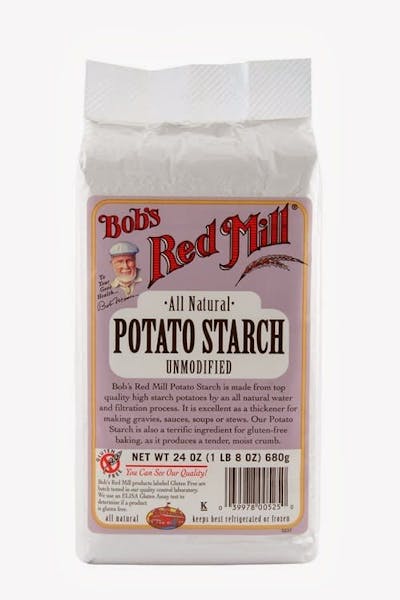Is potato starch keto/LCHF? About resistant starch

Low-carb high-fat
Is potato starch LCHF? Could it lower your blood sugar? Incredibly enough, the answer seems to be that it might. But be wary. It has likely been over-hyped about its benefits, and we still should be hesitant about adding to our diets.
Some research, in very small numbers of people, suggest resistant starch has beneficial effects on blood sugar and insulin resistance. It may also makes you feel fuller and more satisfied, which for some could facilitate weight loss.
It all sounds strange when you first hear about it. How can starch improve blood sugar – isn’t starch broken down to glucose, which raises blood sugar?
How it works
For most people, resistant starch doesn’t break down to glucose. Instead, it passes through the upper intestine to become food for the gut microbiome in the colon, or lower intestine. The gut bacteria digest the resistant starch into short-chain fatty acids, which are absorbed by the body.
Therefore, resistant starch may not act like other carbohydrates. Instead, it is food for gut bacteria and what your body absorbs has been converted into fat.
Feeding the good gut bacteria – and the cells of the intestinal lining – seems to be able to affect hormone levels in the body (GLP-1 etc.), which in turn can have an effect on blood sugar regulation and insulin sensitivity.
It seems also to be beneficial to ensure that gut bacteria and cells get adequate nutrition. Our ancestors no doubt did so, as there are plenty of sources of resistant starch in nature.
However, this is also a potential concern. If we eat one type of resistant starch, potato starch for example, that will feed one specific type of bacteria in our colon. Theoretically, that could create a mismatch of bacteria. Most experts agree that we want a diversity of bacteria without having too many of any one type.
There is also the risk that it may contribute to SIBO, small intestinal bacterial overgrowth.
That’s why, if you choose to take resistant starch, it should be in limited amounts in a variety of different types.
The four main types are:
- Type 1 in grains, seeds, and legumes (generally not recommended on a keto diet)
type 2 in raw potatoes and unripe bananas (also usually not recommended on a keto diet)
Type 3 in potatoes and white rice once they have been cooked and then cooled (also usually not recommended on a keto diet)
Type 4 in manmade sources such as potato flour
What to do
First, be careful. Make sure you document for yourself if resistant starch will affect your blood sugar level or ketone levels.
You can start with cold potato starch. Not very yummy, but a couple of tablespoons stirred in water, per day, seems to be enough to see an impact.
It may be wise to start with less and increase gradually to reduce the risk of a side effect: gas. Also, note that you shouldn’t heat the potato starch – then it will be converted to regular starch that raises your blood sugar.
Those who are not carbohydrate sensitive – for example lean, healthy, exercising people – have more options, but those who are insulin resistant or carb sensitive should limit their use and use with caution.
Future science and experience will lead to more knowledge about who will benefit from resistant starch and how to best take it. Today, knowledge is still limited and it’s a good idea to try for yourself and see what effect you get.
Have you tried cold potato starch or other sources of resistant starch? Please let us know in the comments below.
More
Mark Sisson’s guide, including links to studies: The Definitive Guide to Resistant Starch
Richard Nikoley, Free the Animal: A Resistant Primer for Newbies
PS: The danger of resistant starch
There’s a danger with discussions on resistant starch. The danger is that there are manufacturers ready to start promoting high-carb junk – bread, pasta, candy – with fairy tale promises that the carbohydrates are “resistant” or protected.
Like the decade-long story of Dreamfield’s pasta fraud shows, you can’t trust the people selling “low-carb” products. What is labeled as “resistant” carbohydrates in expensive, colorful packaging, may very well be a fraud:
The Dreamfields Pasta Fraud Finally Results in an 8 Million Dollar Fine!


